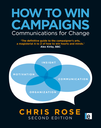Planning Effective Campaigns
- Overview
-
An advanced workshop on preparing and executing world class campaigns. This is for experienced campaigners with a strong understanding of campaign planning and execution. The day will focus predominantly on effective communication with diverse audiences, based on Chris Rose’s extensive experience and analysis.
Business has money, government has law but campaigns have only public support. Communication is the campaigners’ instrument for change, not simply a way to publicise an opinion. Campaigns use communication to gather support, create pressure and exert influence. For most non governmental organisations (NGOs), their only resource to secure real change is public persuasion
These will include an introduction to campaign tools and techniques, issue mapping, framing, values and heuristics, communications factors and proposition-making, visual language, the history of campaigning and the differences between campaigning and advocacy.
It will also touch on values modes: how the differing values people hold results in different behaviours and results in different types of messaging appealing to them. This is especially important in 2019 since the political outcomes of Brexit, Trump's election and beyond have revealed societies that seem deeply divided while NGOs have traditionally only appealed to those who already agree with them. Applying values modes to messaging helps go beyond personal and organisational bubbles.
Agenda
| Planning Effective Campaigns, Sunday, April 7 |
||
|---|---|---|
| 19:30 | Dinner: pre-training dinner, Get to know the other training participants over food and drink. Informal and location to be determined by those wishing to join. Dinner not included in training price. | |
| PLANNING Effective Campaigns on Monday April 8 |
||
|---|---|---|
| 08:45-09:00 | Check in: grab your name tag and say hello! You also might want to grab a cup of coffee or tea | |
| 09:00-09:30 | Welcome and introduction: An overview of the training day and identify specific participant interests/questions | |
| 09:30-11:00 |
Part 1: Introduction to Campaign Tools
|
|
| 11:00-11:30 | Break | |
| 11:30-13:00 | Part 2: Propositions, Visual Language and Framing
|
|
| 13:00-14:00 | Lunch (included) & table discussions | |
| 14:00-15:30 |
Part 3: Heuristics and Motivational Values
|
|
| 15:30-16:00 | Break | |
| 16:00-17:00 |
Part 4: Organising Campaigns
|
|
| 17:00-17:30 | Participant Q&A / Discussion Time for addressing any unanswered questions, discussing the learning, etc. | |
| 17:30 | End of training | |
| 17:30+ | Anyone joining the 2019 Campaigning Forum (or wishing to mingle with ECF 2019 participants) continues for the pre dinner briefing, dinner (£40) and/or pub after dinner. |
|
Preparing
Participants will be invited to complete a short questionnaire about themselves and what they’d most like to get from the day, prior to the event. This is not obligatory but will help Chris in planning the final content.
Similarly, it will help the session on motivational values if the group all complete the CDSM online values questionnaire so we can produce a group map – this should make the session more interesting.
Information will be circulated about both of the above.
It is not essential but may be useful if participants have also looked at, if not actually read (!) two of Chris’s books - How to Win Campaigns: Communications for Change Edition 2 (Taylor and Francis/Earthscan 2010) and What Makes People Tick: The Three Hidden Worlds of Settlers, Prospectors and Pioneers (Troubadour 2011). “The author can bring copies of the ‘What makes people tick' book to purchase on the day (cash) for £10 (half price).
You can also get an idea of some of Chris’s work from visiting www.campaignstrategy.org
Finally, all participants are invited to come armed with a simple 2 minute presentation of a campaign they are working on, worked on or would like to work on, so that it can be used in the sessions where helpful for exercises. Just a verbal description will do, although it will be useful to sketch it out on a flip chart sheet on the day. If you bring something ready-prepared, please keep it simple !
- About the Trainer
-
 Chris is a UK-based master campaigner and globally recognised expert on campaign design. He will distil 30 years of practice and research for NGO (environment, aid, union, health, other) campaigners.
Chris is a UK-based master campaigner and globally recognised expert on campaign design. He will distil 30 years of practice and research for NGO (environment, aid, union, health, other) campaigners.When Chris was young his dad gave him a popular book on psychology called The Hidden Persuaders, by Vance Packard. Along with a Penguin paperback, The Shocking History of Advertising, they provided his first inklings that communication wasn't simply a natural and neutral process but an intervention in human affairs in itself, and one that could determine important outcomes.
Chris Rose is a campaigns and communications consultant and Director of Campaign Strategy Ltd based in the UK. He has 30 years experience working for NGOs, national and international public bodies and private companies. Formerly Programme Director in the UK and International Strategic Adviser for Greenpeace, he has run or developed environmental campaigns ranging from the Brent Spar to rainforests, and worked for public sector clients on topics from illegal drugs to risk communications, fear of crime and sustainable housing.
As well as working for WWF International, Friends of the Earth and advising on hundreds of campaigns for other organisations on topics from human rights to flooding, he is an ecologist and author of books such as How to Win Campaigns: Communications for Change, and What Makes People Tick: The Three Hidden Worlds of Settlers, Prospectors, and Pioneers.


